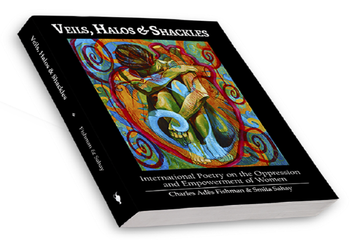Unveiling The Horror - Veils, Halos And Shackles
Veils, Halos and Shackles is a formidable collection of free verse that categorically steers clear of euphemism in its accounts of violence against women. It calls a spade a spade, many times over.
Stirred into action by the horrific rape of Delhi girl Jyoti in December, 2012, Smita Sahay and Charles Ades Fishman decided it was time the voice of women the world over was heard, that it was time women knew that they were not alone. Equally important, it was time to get men to face the lifelong damage caused by their casual, callous abuse. They must realize that they have to stop perpetuating and perpetrating violence against women.
In the introduction, Laura Madeleine Weismann refers to a talk she once heard, given by a man, who pointed out that ‘The word ‘male’ is often dropped from the phrase ‘male violence against women’.
Dropping this word makes violence against women seem like an abstraction--it’s happening to someone, somewhere, someone is doing it. This book gives a face to the abusers--he is the man on the street, he is the teacher, the trusted friend, the father, the brother, the beloved husband. He is sometimes himself a victim of peer pressure and can be as young as twelve or thirteen. This anthology will help these men recognize themselves--the first step in remedial action.
The poets are victims, teachers, and helpers, observers, all of whom have been closely associated with the unspeakable suffering that is abuse--their own or someone else’s. The poets also speak to the readers immediately after their verse. They speak of what made them write about violence and abuse against women in the first place; that puts their outpourings in context.
It was deeply educating to meet the sensibilities of different poets from the world over. Victim blaming and sexual assault seem ‘statistically inevitable’, claims one; and I was shocked into recognizing that we all actually, tacitly, accept this. Another offers the cold inescapable truth that anyone can be abusive:
‘The physically abusive impulse doesn’t understand the feeling of net worth.’
The representation ranges from the seemingly liberated European or American women to African tribals to a Gujarati Dalit poet. The tales of abuse are from ‘faraway countries and from right next door’.
A good number of the poems are exquisite, and it makes you wonder that stories of suffering can be written so. Some poems, like Elizabeth Beck’s pick out the horrors of child abuse through and elegant prose poem, ‘Edelweiss and My Mother’s Apron’ and ‘Silver Spoon and Daddy’s Little Girl’. Cheryl Cowlan’s simple verse in ‘The Importance of Mustard’ shows how an everyday occurrence can turn into something unpredictable and violent and how it destroys a woman’s ability to
‘Think….stay calm…’ Blank Day, Name Me, Carry On Baggage employ a staccato beat, that jolts with its economy and simplicity of words, while other poems meander through descriptions of a seemingly innocuous situation and suddenly startle you with the a sudden, violent account of the sudden violence that is typical of domestic abuse.
Though the literary merit of the poems varies, the effect does not. The underlying suffering in each is palpable. Some poems speak to you immediately. Some others you have to revisit. Some continue to haunt with images like ‘the rose-shaped scar’ and the ‘melting breasts’ of the victim of an acid throwing. ‘Such poetics do more than speak to power. They resist the abuses of power by imaging a better world.’
In this world, a woman need not choke on ‘the stink of unsaid words rotting in her throat’. She can walk out, have her community support her, continue to love herself and live with dignity. In this world, there will also be a greater number of awakenings via menstoppingviolence.org and other groups that it inspires.
image not our own
















